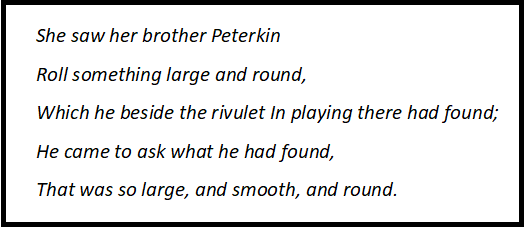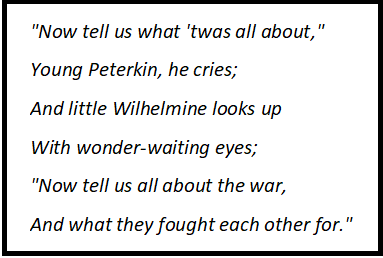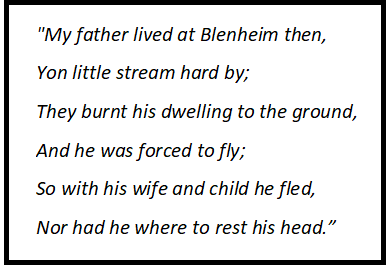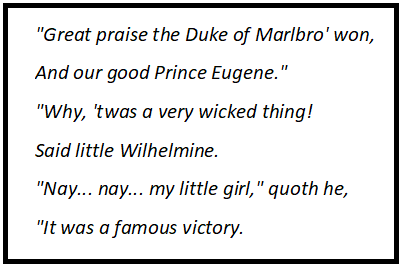Hi Everyone!! This article will share After Blenheim Questions & Answers.
In my previous posts, I have shared the questions and answers of The Old Man at the Bridge and An Angel in Disguise so, you can check these posts as well.
After Blenheim Questions & Answers
Question 1: Read the stanza and answer the questions:
(a) Whose family has been referred to earlier in the context?
Answer: The family of Old Kaspar has been referred to in the extract. His granddaughter Wilhelmine and grandson Peterkin.
(b) Who was Wilhelmine? What was she doing?
Answer: Wilhelmine was Old Kaspar’s granddaughter. She was playing on the grass.
(c) What did she see Peterkin doing?
Answer: The little girl Wilhelmine saw her brother Peterkin rolling something that was large and round. Peterkin had found the thing by the side of a stream while playing.
(d) Why did Peterkin come home?
Answer: Peterkin, while playing had found something which he had brought home to ask his grandfather what it was.
(e) What did his grandfather tell him?
Answer: The old man Kaspar took it from Peterkin who stood expectantly for an answer. Kaspar looked at it, shook his head in sorrow and sighed. He said that it was somebody’s skull.
After Blenheim Questions & Answers
Question 2: Read the stanza and answer the questions:
(a) What was the curiosity in young Peterkin’s mind?
Answer: Peterkin was curious to know why the war was fought. He was anxious to know everything about the war. He could not comprehend the validity of war and considered it futile.
(b) Explain the expression, ‘wonder- waiting eyes’.
Answer: Wonder-waiting eyes is used for Wilhelmine who was eagerly waiting for an answer from her grandfather. It is an alliteration. It means surprised, waiting for a reply.
(c) “What they fought each other for”? This is the most puzzling question in the context of all wars. How?
Answer: The children wanted to know the outcome of war from their grandfather, Old Kaspar. They failed to understand why the war was fought. There can never be a valid reason for war as it leads to death and destruction.
(d) What answer did the old man provide?
Answer: The response of Old Kaspar was that he did not know what good came out of the war, but he still felt it was ‘a famous victory’. His response is conventional.
(e) Why did the old man’s reply fail to satisfy the young children?
Answer: The children did not understand how their grandfather could praise the war which was totally purposeless and destructive. Old Kaspar’s reply is conventional and undaring, guided by blind patriotism. The poem projects the difference between the viewpoints of the old and new generations.
After Blenheim Questions & Answers
Question 3: Read the stanza and answer the questions:
(a) What happened at Blenheim?
Answer: A battle known as the battle of Blenheim was fought in 1704 in the village of Blenheim between the English and the Austrians on the one side and the French on the other side. The battle resulted in a grand victory of the English under the Duke of Marlborough. In this battle, thousands of men were killed, women became widows and children became orphans. The battle caused widespread death and destruction.
(b) Who were ‘they’ referred to in line 3 of this stanza?
Answer: ‘They’ is referred to the soldiers of the French army.
(c) How was ‘the great victory’ a personal tragedy for Kaspar’s family?
Answer: Old Kaspar’s father lived at Blenheim during the war. His own house was burnt down, and he had to flee with his family. He had no place to take shelter.
(d) What made Kaspar praise a horrible incident?
Answer: Kaspar was of the old conventional view that war should be praised and victory hailed. Therefore even though it was a horrible incident he praised it.
(e) Why did his grandchildren fail to understand his viewpoint?
Answer: The children did not understand how their grandfather could praise the war which was totally purposeless and destructive. Old Kaspar’s reply is conventional and guided by blind patriotism. The poem projects the difference between the viewpoints of the old and new generations.
After Blenheim Questions & Answers
Question 4: Read the stanza and answer the questions:
(a) Why did Kaspar praise the Duke of Marlbrough and Prince Eugene?
Answer: Old Kaspar praised the Duke of Marlborough and Prince Eugene because under their rule the English were able to defeat the French in the battle of Blenheim. According to Old Kaspar, it was a grand and a famous victory worthy of praise.
(b) What was the ‘wicked thing’? Why was it wicked?
Answer: According to Wilhelmine war was ‘wicked’. It was wicked because she could not understand and tolerate the old man’s point of view and praise of war when it had caused such great misery.
(c) Who was Wilhelmine? Why was she horrified by the account of war given by her grandfather?
Answer: Wilhelmine was Old Kaspar’s granddaughter. She was horrified by her grandfather’s praise of war and has a natural and instinctive response to war. She calls it a ‘wicked thing’ and does not agree with her grandfather’s conventional views.
(d) There are two pauses in the line – “Nay…nay…my little girl,” quoth he. What do these pauses show?
Answer: The pauses show that Old Kaspar is also confused when Wilhelmine calls war wicked. He has no justification for it and only repeats what has been told to him by people that the battle of Blenheim was a famous victory.
(e) What is the message of the poem?
Answer: After Blenheim is an anti-war poem that uses an ironic structure to give the message that war is futile and it should not be praised. Thousands of soldiers and ordinary people are killed, wounded or maimed. Houses are burnt, people become homeless and suffer physical and mental anguish. The difference in viewpoints of the old and new generation is brought forth to highlight the horrible consequences of war.
So, these were After Blenheim Questions & Answers.



